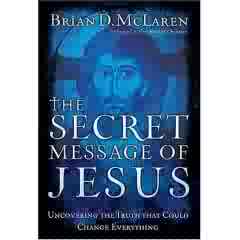 Dialogue is taking place between evangelicals and Latter-day Saints in a number of venues. Scholars from these religious communities have been gathering on an annual basis for a number of years, Greg Johnson and Bob Millet have engaged in many public dialogues, Biola University and Azusa Pacific University students have been dialoguing with students from Brigham Young University, and of course informal dialogues continue among individual evangelicals and Mormons. While individual dialogues take place in our neighborhoods and workplaces they don't seem to raise much concern. But the more formal dialogues mentioned above are viewed with suspicion and fear by members of both communities. Concerns and distrust have been expressed from both camps, so much so that these dialogues remain a fragile process, threatened to the point of extinction with the application of appropriate pressures from either side. But I'd like to suggest that these dialogues need to continue, hopefully expanded, and provide a few reasons why.
Dialogue is taking place between evangelicals and Latter-day Saints in a number of venues. Scholars from these religious communities have been gathering on an annual basis for a number of years, Greg Johnson and Bob Millet have engaged in many public dialogues, Biola University and Azusa Pacific University students have been dialoguing with students from Brigham Young University, and of course informal dialogues continue among individual evangelicals and Mormons. While individual dialogues take place in our neighborhoods and workplaces they don't seem to raise much concern. But the more formal dialogues mentioned above are viewed with suspicion and fear by members of both communities. Concerns and distrust have been expressed from both camps, so much so that these dialogues remain a fragile process, threatened to the point of extinction with the application of appropriate pressures from either side. But I'd like to suggest that these dialogues need to continue, hopefully expanded, and provide a few reasons why.First, let me point out that I am advocating responsible dialogue, that which clearly articulates the views of both religious communities without compromise, but which is also done in ways which are respectful and civil. Critics of the dialogue process are concerned about the appropriate cautions and safeguards being built into this process, and this is a helpful reminder that dialogue can be reduced to forms that ignore the very real differences between evangelicals and Latter-day Saints. None of my colleagues support such a problematic form of dialogue, and hopefully this will help alleviate some of the fears out there.
Second, I'd like to see these dialogues expanded. I believe the venues mentioned above are important and should continue, but beyond these I'd like to see entire evangelical church congregations and LDS wards get together. These would not be done with theological agendas for proselytizing, but as social gatherings that bring together people who mutually reflect the image of God and who need to spend more time talking to each other rather than merely about each other. Perspectives on matters of faith would naturally arise during these gatherings, but they would not be focal point for the interactions. I can testify to the value of such efforts. My involvement with my LDS neighbors at neighborhood barbecues has resulted in a number of rewarding experiences for all of us. They have built relationships based upon understanding and trust that at times has included the respectful discussion of spiritual things. What if these small gatherings were expanded beyond individual neighbors meeting here and there and which involved whole churches and wards?
 My wife and I recently had the opportunity to watch the wonderful LDS film Baptists at Our Barbecue. The film did a wonderful job at presenting a comical look at the fears (sometimes bordering on paranoia) that both Mormons and evangelicals feel living in close proximity. But it also portrayed the courage that a few people had to put together a community event that brought these two subcultures together. Perhaps what these filmmakers envisioned in entertainment can become reality through the courageous efforts of like-minded evangelicals and Mormons.
My wife and I recently had the opportunity to watch the wonderful LDS film Baptists at Our Barbecue. The film did a wonderful job at presenting a comical look at the fears (sometimes bordering on paranoia) that both Mormons and evangelicals feel living in close proximity. But it also portrayed the courage that a few people had to put together a community event that brought these two subcultures together. Perhaps what these filmmakers envisioned in entertainment can become reality through the courageous efforts of like-minded evangelicals and Mormons.Third, I recognize that real fear exists among representatives of both communities, and we certainly shouldn't gloss over the risks involved in interreligious and intercultural engagement, but we should not let the challenges overshadow the opportunities and the benefits. While both religious communities might be fearful of such prospects in terms of potential loss of members to "the other side," the reality is that interreligious dialogue results in a loss of ignorance and fear, and a strenghtening of committment to one's own faith rather than large scale faith defections. It would appear that there is more to be gained than to be lost in dialogical exhanges between our faith communities.
Fourth and finally, should our dialogues discontinue, or should they be stopped by those concerned about this process, what is the alternative? Will we return to the options of the past in terms of ignoring each other, or perhaps more commonly, will we resume our attacks on each other? We have been lobbing doctrinal and worldview handgrenades at each other through the course of our overlapping histories, and I wonder how anxious we are to continue this process. It seems that we either find a way to work together through the challenges and difficulties of the dialogical process in various venues or we return to the ways of the past that really didn't benefit either community.
The world is growing increasingly smaller, and it is more and more common for people of diverse religious backgrounds to live and work in close proximity to each other. Our continued dialogue in spite of our concerns and fears provides us with a helpful tool that makes our world and our neighborhoods better places to live. I urge members of both religious communities, evangelicals and Mormons alike, to pursue the path of dialogue with the resulting fruits of understanding, trust, and relationships, rather than the path of silence with its fruits of ignorance, stereotypes, and distrust.
Photo source credits: http://sergecar.club.fr and http://www.ldsfilm.com.



